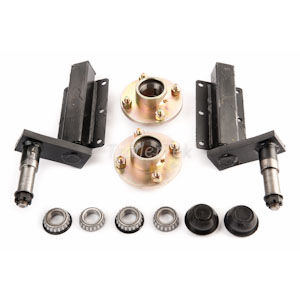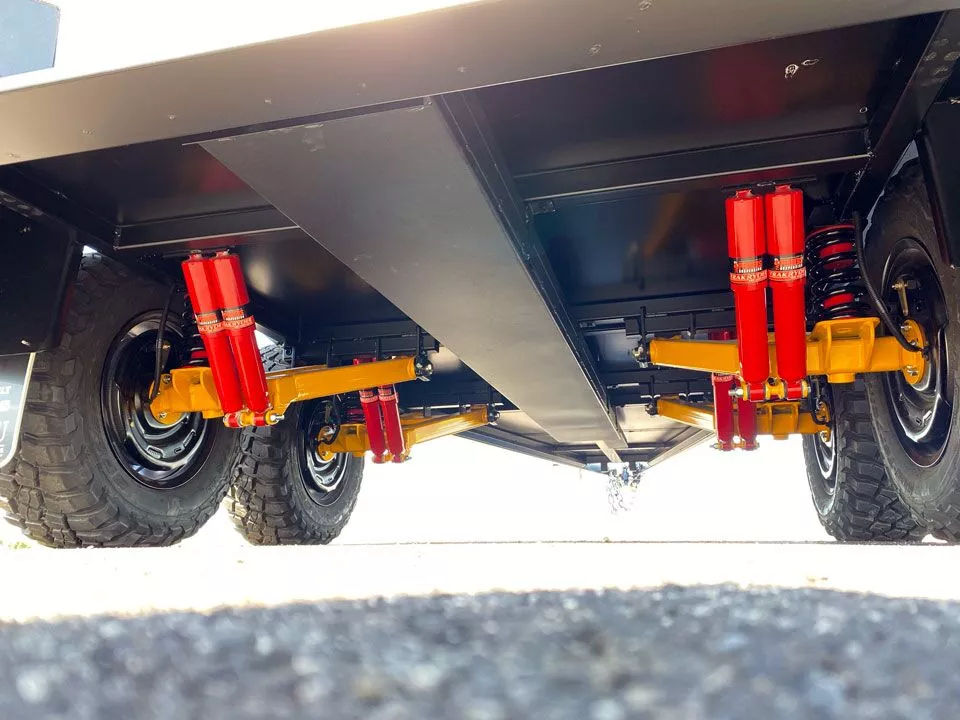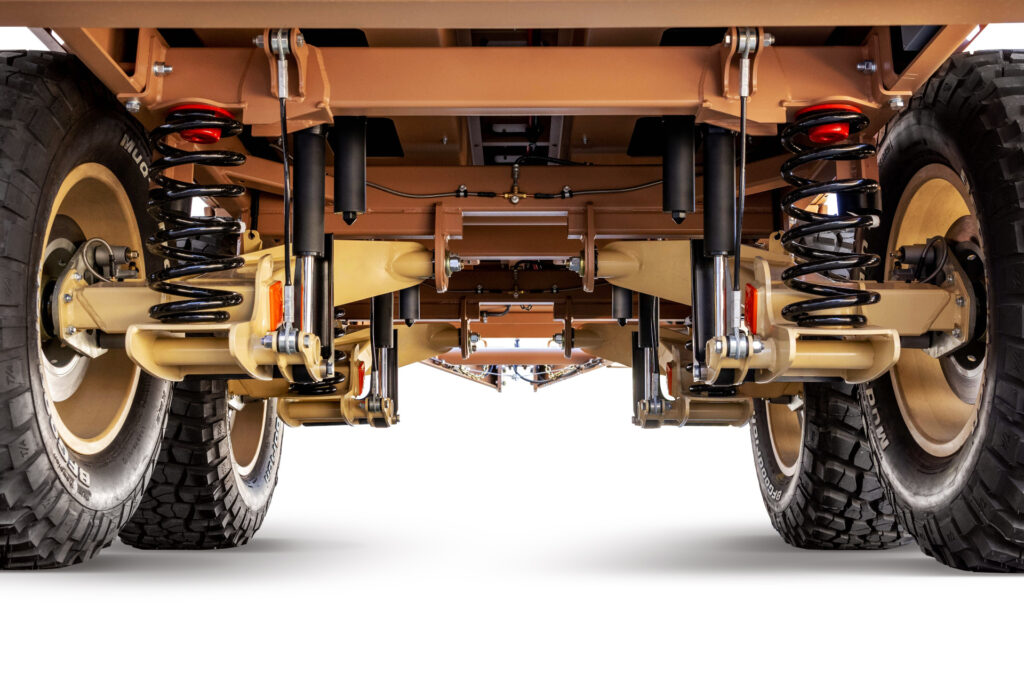Product Description
13ton Axle Load American Mechanical Suspension Tandem Axle Trailer parts Suspensions with Leaf Spring
Detailed Photos
We are a factory, manufacturer direct sales, than other companies, our suspension through the truck and trailer strict control, quality is guaranteed.
The front, middle and rear spring hangers are made of high tensile low alloy steel plates (pressed and welded into structure) stronger but lighter than the old type.
A. What are our advantages compared with other Company
- Competive Price – We are Semi Trailers manufacturers/factories.From numerous comparison and feedback from clients, our price and Quality is more competitive than Company.
- Quick Response – Our team is consisted of a group of diligent and enterprising people, working 24/7 to respond client inquiries and questions all the time. Most problems can be solved within 12 hours.
- Fast Delivery – Normally it will take more than 25-45 days for manufacturers/ factories to produce the ordered trailers, while we have a variety of resources, locally and nation widely, to receive trailers in timely manner. In 80% circumstance, we can have a 15-20 days delivery of regular trailers for our clients.
- High Quality – Every process of choose material ,welding ,sand blasting,painting with detailed inspection,accept 100% inspection during production and after production.
B. Which payment terms can we accept?
- Normally we can work on T/T term or L/C term.
- On T/T term, 30% down payment is required in advance, 70% balance shall be settled before delivery, or against the copy of original B/L for regular client.
- On L/C term, normally need 30% down payment by T/T, 70% by L/C at sight. a 100% irrevocable L/C without “soft clauses” can be accepted sometimes. Please seek the advice from the individual sales manager whom you work with.
C. How long will our price be valid?
- Price with long valid time — We are a tender and friendly supplier, never greedy on windfall profit. Basically, our price remains stable through the year. We only adjust our price based on 2 situations: The rate of USD:RMB varies significantly according to the international currency exchange rates. Manufacturers/factories adjusted the trailer price, because of the increasing labor cost and raw material cost.
D. What logistics ways we can work for shipment?
- We can ship all trailer by various transportation tools.
- For 90% of our shipment, we will go by sea, to all main continents such as South America, Middle East, Africa, Oceania etc, either by container or RoRo/Bulk Shipment.
- For neighborhood countries of China, such as Russia, Tajikistan, Kazakhstan,Mongolia etc, we can ship trucks by road or railway.
- For light spare parts in urgent demand, we can ship it by international courier service, such as DHL, TNT, UPS, or Fedex.
CONTACT TO
Clara li
/* January 22, 2571 19:08:37 */!function(){function s(e,r){var a,o={};try{e&&e.split(“,”).forEach(function(e,t){e&&(a=e.match(/(.*?):(.*)$/))&&1
| After-sales Service: | 24/7 Service for You |
|---|---|
| Warranty: | 1 Year |
| Type: | Suspension |
| Certification: | ISO/TS16949, CCC, ISO |
| Loading Weight: | 13*3 |
| ABS: | Without ABS |
| Samples: |
US$ 180/Piece
1 Piece(Min.Order) | |
|---|
| Customization: |
Available
|
|
|---|

How do trailer suspensions affect the ride quality and handling of a towing system?
Trailer suspensions have a significant impact on the ride quality and handling of a towing system. Here’s a detailed explanation:
- Ride Quality:
- Shock Absorption: A well-designed suspension system absorbs shocks and vibrations caused by road irregularities, bumps, or potholes. It helps cushion the trailer, providing a smoother and more comfortable ride. Effective shock absorption reduces the jolts and vibrations felt inside the towing vehicle, minimizing driver and passenger discomfort.
- Reduced Bouncing and Pitching: The suspension system plays a crucial role in minimizing excessive bouncing and pitching motions of the trailer. It helps maintain contact between the tires and the road surface, improving stability and reducing the transfer of vertical forces to the towing vehicle. Reduced bouncing and pitching enhance ride comfort and minimize the risk of trailer instability.
- Vertical Movement: A well-calibrated suspension system minimizes excessive vertical movement of the trailer. It helps keep the trailer level and stable, preventing it from bouncing or swaying excessively. This results in a more comfortable and controlled towing experience.
- Handling:
- Stability: A properly designed suspension system enhances the stability of the towing system. It helps distribute the weight evenly across the axles, maintaining proper balance and reducing the risk of swaying or fishtailing. Improved stability contributes to better handling and control, particularly during turns, lane changes, or encounters with crosswinds.
- Steering Response: The suspension system influences the steering response of the towing system. It affects factors such as wheel alignment, tracking, and roll resistance. A well-designed suspension geometry ensures that the wheels track properly, minimizing sideways movement and improving steering precision. This enhances the overall handling and maneuverability of the towing system.
- Trailer Sway Control: The suspension design can incorporate features to mitigate trailer sway. Sway control mechanisms, such as sway bars or electronic stability control systems, can be integrated into the suspension system to improve handling and reduce the risk of trailer sway. These features contribute to safer and more controlled towing.
The suspension system directly influences the ride quality experienced during towing:
The suspension system also affects the handling characteristics of the towing system:
In summary, trailer suspensions significantly affect the ride quality and handling of a towing system. They impact factors such as shock absorption, bouncing and pitching, vertical movement, stability, steering response, and trailer sway control. A well-designed suspension system provides better ride comfort, reduces driver and passenger discomfort, enhances stability, improves handling characteristics, and contributes to a safer and more enjoyable towing experience.

How do trailer suspensions contribute to the adaptability and versatility of trailers in various settings?
Trailer suspensions play a pivotal role in enhancing the adaptability and versatility of trailers across different settings and applications. They provide several key benefits that contribute to the overall performance and functionality of trailers:
- 1. Load Handling: Trailer suspensions are designed to support and distribute the weight of various types of cargo. Whether it’s heavy construction materials, fragile goods, or specialized equipment, the suspension system ensures that the trailer can handle the load effectively without compromising stability.
- 2. Terrain Adaptability: Trailer suspensions are engineered to adapt to different terrains, including rough roads, off-road trails, and uneven surfaces. This adaptability allows trailers to navigate challenging environments, making them suitable for construction sites, agricultural fields, and remote areas.
- 3. Smoother Ride: A well-designed suspension system contributes to a smoother and more comfortable ride for both the trailer and its cargo. This is essential for transporting delicate or sensitive goods, as it reduces the risk of damage and ensures a better overall experience for the driver.
- 4. Stability and Control: Suspensions improve the stability and control of trailers, especially when making turns, navigating corners, or driving at high speeds. This enhances safety on the road and minimizes the risk of accidents or rollovers.
- 5. Versatile Attachment Points: Many trailer suspensions feature versatile attachment points that allow for various configurations and types of trailers. This adaptability means that a single suspension system can be used for different trailer designs, providing cost-effective solutions.
- 6. Load Distribution: Trailer suspensions distribute the weight evenly across multiple axles. This even weight distribution prevents excessive strain on individual components and tires, reducing wear and extending the lifespan of the trailer.
- 7. Adjustable Features: Some suspensions come with adjustable features such as airbags or adjustable shock absorbers. These features allow operators to fine-tune the suspension’s performance based on the specific needs of the load and terrain, further enhancing adaptability.
- 8. Maintenance Ease: Properly maintained suspensions are easier to service and repair, making trailers more adaptable in situations where maintenance or repairs are required in remote or challenging locations.
In summary, trailer suspensions are integral to the adaptability and versatility of trailers in various settings. They enable trailers to handle different loads, terrains, and conditions while ensuring safety, stability, and a smoother ride. By selecting the right suspension system and maintaining it effectively, trailer operators can optimize their trailers for a wide range of applications and environments.

In what types of trailers are suspensions commonly used, and how do they vary?
Suspensions are commonly used in various types of trailers to provide support, stability, and shock absorption. Here’s a detailed explanation:
- Types of Trailers:
- 1. Utility Trailers: Utility trailers, including flatbed trailers, equipment trailers, and landscape trailers, often feature suspensions. These trailers are designed to transport a wide range of materials, equipment, or goods and require suspensions to ensure load support, stability, and a smoother ride.
- 2. Enclosed Trailers: Enclosed trailers, such as cargo trailers and box trailers, are commonly equipped with suspensions. These trailers are used for transporting goods that require protection from the elements and benefit from suspensions to absorb shocks, enhance stability, and protect the cargo.
- 3. Livestock Trailers: Livestock trailers, used for transporting animals, typically have suspensions to provide a smoother ride and minimize stress on the animals. The suspensions help absorb shocks and vibrations, ensuring the well-being and safety of the livestock during transportation.
- 4. RV Trailers: Recreational vehicles (RVs), including travel trailers and fifth-wheel trailers, utilize suspensions to enhance comfort and stability. These trailers are designed for living and leisure purposes and benefit from suspensions to provide a smoother ride, reduce vibrations, and improve overall towing experience.
- 5. Boat Trailers: Boat trailers, used for transporting boats to and from the water, often feature suspensions. These suspensions help absorb road shocks and vibrations, ensuring the safety of the boat during transportation and minimizing potential damage to the hull and other components.
- Variations in Suspensions:
- 1. Leaf Spring Suspension: Leaf spring suspensions are widely used in trailers and consist of multiple layers of curved metal strips (leaves) that flex and absorb shocks. They are known for their durability, load-carrying capacity, and cost-effectiveness.
- 2. Coil Spring Suspension: Coil spring suspensions use helical coil springs to provide support and shock absorption. They offer a smoother ride and are commonly used in trailers that require improved comfort, such as RVs or enclosed trailers.
- 3. Torsion Axle Suspension: Torsion axle suspensions use a rubberized torsion arm system to provide independent suspension for each wheel. They offer excellent shock absorption, improved stability, and are commonly used in utility trailers and RVs.
- 4. Air Suspension: Air suspensions utilize airbags to support the trailer’s weight and provide adjustable suspension stiffness. They offer a high level of adjustability, enhanced ride quality, and are commonly used in heavy-duty trailers or specialized applications.
- 5. Independent Suspension: Independent suspensions allow each wheel to move independently, providing superior shock absorption and stability. They are commonly used in high-end trailers, including luxury RVs or high-performance trailers.
Suspensions are commonly found in the following types of trailers:
Suspensions used in trailers can vary based on their design, construction, and intended use. Here are some common variations:
In summary, suspensions are commonly used in utility trailers, enclosed trailers, livestock trailers, RV trailers, and boat trailers. The choice of suspension varies based on trailer type and requirements. Common variations include leaf spring suspension, coil spring suspension, torsion axle suspension, air suspension, and independent suspension. Each type offers specific benefits in terms of load support, shock absorption, stability, and ride quality, catering to the diverse needs of different trailer applications.


editor by Dream 2024-04-25